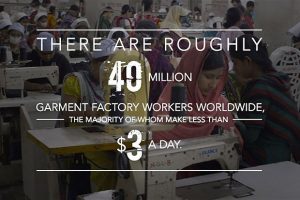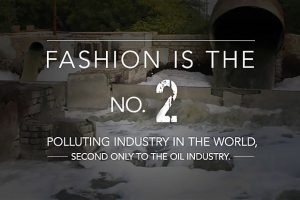

This week we spoke about costs. Not the price tag we see on a piece of clothing, or the time it took us to find a specific shirt, or the rent for the store we bought it in, but the actual “true cost” that includes all of these pieces and so much more. The cost of lives that are abused, underpaid, exploited, unheard and disregarded. I know how easy it is to forget that my shirt was likely made by someone who is not even being paid minimum wage, in a building that doesn’t meet safety standards, without any of the ‘basic’ working conditions just so that I can buy it for a mere $20. In the documentary “The True Cost” they explain how prominent figures in the fashion industry are able to rationalize the idea of producing clothes for such a disgustingly “low cost”. Basically saying that the people in these countries, like Bangladesh, need these jobs and are therefore willing to work in poor conditions, for minimal pay; they fully disregard the fact that these workers are given no alternatives or say in the matter. It’s honestly frightening to see these well-educated, top-level executives rationalize the horrific treatment of other human beings.
Sadly, at the end of the documentary, I felt like there was little I could do as a consumer to help the situation; I can limit how often I buy clothing and I can ensure the clothes are ethically sourced and produced, but the astounding levels of revenue that the fast fashion industry reels in makes it a fairly difficult industry to stop with only the common consumer. Instead, I found that government intervention is imperative in stopping or at least slowing down this detrimental industry. Governments need to be imposing stricter regulations in both the developed nations that are purchasing the clothing, and the developing nations that are producing them. Regulations that insist on better working conditions, better pay, and better benefits, and a more vigilant inspection of these regulations being abided by. Just another example of how governments can be a leading and influential factor in improving sustainability in business, both environmentally and socially.
(Related: Currently Emma Watson is sharing her sustainable fashion solutions on @the_press_tour as she travels to promote her upcoming film Beauty and the Beast.)
(Photos: http://www.takepart.com/photos/true-cost-memes/ )
Thanks for addressing this curtail top Carlene. I personally felt so inspired by this documentary to change my own buying behavior concerning fashion items. Since almost a year now I tried to avoid fast fashion brands very successfully. However I had to sacrifice convenience quite a lot since it takes up a lot of time to research fair fashion companies, which fit your needs.
I agree with you that governments would have great power to improve the situation and promote fair fashion. In fact the german federal ministry of economic cooperation and development launched the Vero& Selvie campaign (https://www.vero-selvie.de/de) which promotes fair fashion in order to make it a common purchasing criteria.
I haven’t yet seen the true cost documentary, however it is definitely at the top of my watching list. I did a report on child labour and unsafe working conditions for factory workers in less developed countries and I often found myself thinking that maybe these factories are the best place for these people. You are right in saying these people are completely overlooked and treated like disposable property that costs a minimal amount of money. With the idea that these people have no other alternatives, I think that the main alternative to many would be to go into sex trafficking, drugs and crime. Until there is greater development in bettering factory situations or education institutions, maybe the best place for these people is scraping by on their wages from making cheap clothes for materialistic consumers.